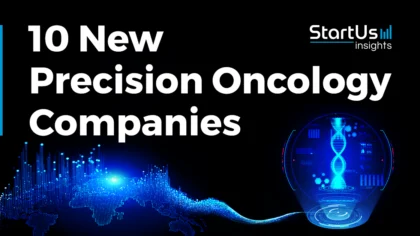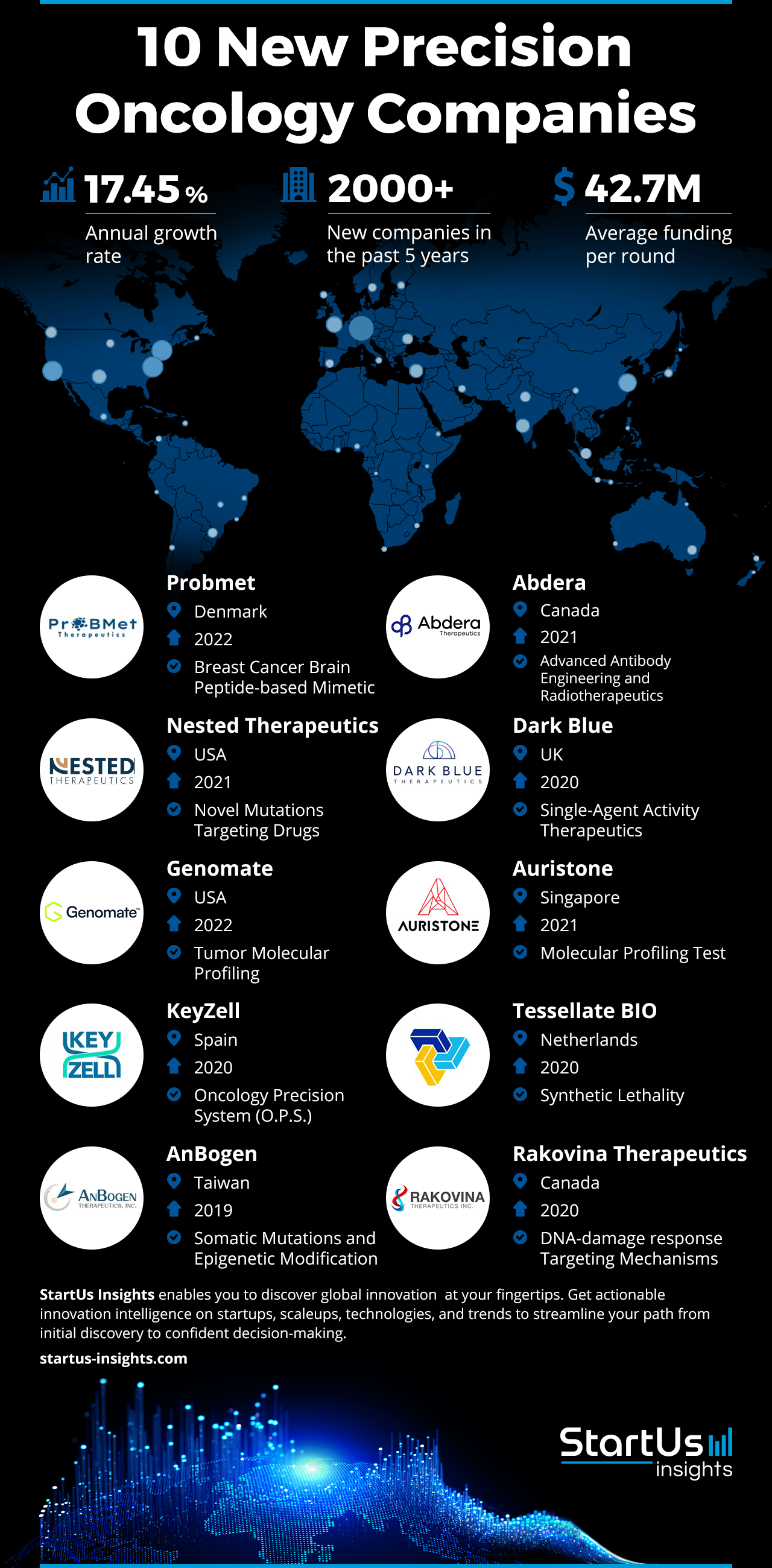This article highlights 10 new precision oncology companies that match therapies to patients’ unique genetic profiles. They use methods including single-agent activity therapies, molecular profiling assays, advanced radiotherapeutics, antibody engineering, and more. Each company approaches the diagnostics, treatment planning, and therapy selection to tailor cancer care.
Continue reading to gain up-to-date and data-driven insights on:
- Profiles of 10 Emerging Precision Oncology Companies
- How to Scout the Best Precision Oncology Companies Easily
Key Takeaways
Drawing insights from the Big Data & AI-powered StartUs Insights Discovery Platform that provides data on over 4.7+ million emerging companies globally, we explore the evolving landscape of the precision oncology industry. This sector is marked by key trends and a substantial workforce, shaping its future. Here are some key insights at a glance:
- Latest Precision Oncology Trends: The latest precision oncology trends include molecular diagnostics and profiling, predictive analytics, drug repurposing, regenerative medicine, and radiomics.
- Precision Oncology Industry Statistics: The precision oncology industry encompasses 2K+ organizations with an annual growth of 17.45%. It employs about 23 people and has seen the emergence of 450+ new precision oncology companies in the past five years. Witnessing 2020 as the average founding year, these companies receive an average funding of 42.7M.
- 10 New Precision Oncology Companies to Watch:
- Probmet – Breast Cancer Brain Peptide-based Mimetic
- Nested Therapeutics – Novel Mutations Targeting Drugs
- Genomate – Tumor Molecular Profiling
- KeyZell – Oncology Precision System (O.P.S.)
- AnBogen – Somatic Mutations & Epigenetic Modification
- Abdera – Antibody Engineering & Radiotherapeutics
- Dark Blue – Single-Agent Activity Therapeutics
- Auristone – Molecular Profiling Test
- Tessellate BIO – Synthetic Lethality
- Rakovina Therapeutics – DNA-damage Response (DDR) Targeting
Discover 10 out of 450+ New Precision Oncology Companies
In this part, we feature 10 top precision oncology companies using technologies such as the oncology precision system (OPS), somatic mutations, epigenetic modification, synthetic lethality and DNA-damage response (DDR) targeting techniques, and more to treat challenging cancer cases. These solutions combine clinical applications and bioinformatics to develop therapies based on the unique genetic composition of each tumor. We updated this report 5 days ago. Missing information? Contact us to add your insights.
Note on Signal Strength
One of the unique metrics we feature for each company is Signal Strength, a proprietary data point generated by our Discovery Platform. It gauges the extent to which a company’s influence has permeated the global ecosystem of startups, scaleups, and emerging companies. This proprietary metric serves as a valuable guidepost for understanding a company’s standing in the broader market landscape.
1. Probmet
- Founding Year: 2022
- Employee Range: 2-10
- Location: Denmark
- Signal Strength: Very Strong
- What they do: Probmet develops a peptide-based mimetic for breast cancer brain metastases. The drug targets the neuropeptide leucine-rich glioma inactivated 1 (LGI1) and the receptor ADAM22 as a biomarker selection. This mimetic crosses the blood-brain barrier and reduces tumor cell growth, validating in both human and animal breast cancer models.
2. Nested Therapeutics
- Founding Year: 2021
- Employee Range: 11-50
- Location: USA
- Signal Strength: Very Strong
- What they do: Nested Therapeutics discovers medications that target brand-new cancer cell abnormalities. These mutations cause changes in protein structure or generate new binding pockets at the larger protein complex interface. The company develops a drug discovery platform that integrates chemical biology, computational biophysics, machine learning, and genomics. Its program, NST-628, targets the Ras/mitogen-activated protein kinase (RAS/MAPK) pathway. It focuses on mutation-defined cryptic pockets, with programs targeting the p53 pathway, an allosteric molecule targeting a transcriptional regulator that mutates in cancer. This provides precision medicine to patients with advanced metastatic cancers.
3. Genomate
- Founding Year: 2022
- Employee Range: 11-50
- Location: USA
- Signal Strength: Very Strong
- What they do: Genomate provides an AI-powered clinical decision support tool for oncologists, enabling precise matching of targeted therapies to patients’ molecular profiles. The process begins with molecular profiling, where next-generation sequencing techniques identify genetic alterations in a patient’s tumor. Genomate then examines these genetic alterations to comprehend the features of the tumor. Finally, it produces an individualized report that ranks possible medications based on the unique tumor profile. This improves decision-making by providing tailored treatment recommendations, cutting down on guesswork, and quickly analyzing complex data.
4. KeyZell
- Founding Year: 2020
- Employee Range: 11-50
- Location: Spain
- Signal Strength: Very Strong
- What they do: KeyZell develops the Oncology Precision System (O.P.S.), a SaaS tool that enhances oncologists’ decision-making with personalized therapy predictions. Using patient data such as clinical, molecular DNA profiles, and therapy efficacy, this application uses machine learning to analyze up to 112 biomarkers. It incorporates treatment plans with outcomes and toxicity measures to support clinical decisions and improve patient prognosis.
5. AnBogen
- Founding Year: 2019
- Employee Range: 11-50
- Location: Taiwan
- Signal Strength: Strong
- What they do: AnBogen develops a platform to identify candidate compounds for cancer indications. It consists of ABT-202, a second-generation K-Ras inhibitor that defeats resistance mutations, and ABT-101, a tyrosine kinase inhibitor for non-small cell lung cancer (NSCLC). Furthermore, the histone deacetylase inhibitor ABT-301 increases the expression of tumor suppressor genes. With a focus on epigenetic modification of histone deacetylase inhibition and actionable somatic mutations, this pipeline targets a variety of solid tumor types.
6. Abdera
- Founding Year: 2021
- Employee Range: 11-50
- Location: Canada
- Signal Strength: Very Strong
- What they do: Abdera uses antibody engineering and radiotherapeutics to produce the Radio Optimized Vector Engineering (ROVEr) platform. The platform attaches a cancer cell-specific molecule to a chelating agent, which then binds a radioisotope to target and kill cancer cells. This targeted delivery minimizes harm to healthy cells. ROVEr offers features including targeting various cancers, using potent alpha- or beta-emitting radioisotopes, and engineered antibodies for reduced systemic exposure.
7. Dark Blue
- Founding Year: 2020
- Employee Range: 2-10
- Location: UK
- Signal Strength: Strong
- What they do: Dark Blue targets weaknesses in cancer cells by developing precision therapies that integrate drug discovery, functional genomics, and chemicals. This method supports therapeutic single-agent activity theories and provides information about the mechanism of action. It also improves dose schedules and identifies combo medicines. Additionally, it allows for molecular definition of patient populations that benefit from the medicines, facilitating clinical trials and regulatory approval.
8. Auristone
- Founding Year: 2021
- Employee Range: 2-10
- Location: Singapore
- Signal Strength: Very Strong
- What they do: Auristone’s EPI-CALL provides a molecular profiling test that combines genomic and epigenomic analysis to assist in the selection of cancer therapy. It uses whole transcriptome sequencing (WTS) and bulk RNA sequencing (RNA-Seq) to produce a molecular profile. EPI-CALL also uses a proprietary algorithm that looks at gene fusion occurrences, alternate promoter score (APS), gene expression level, and alternate isoform expression to predict immunotherapy responses. This way, EPI-CALL identifies a BCR-ABL gene fusion, a marker for chronic myeloid leukemia (CML), that enables oncologists to choose appropriate targeted treatment.
9. Tessellate BIO
- Founding Year: 2020
- Employee Range: 11-50
- Location: Netherlands
- Signal Strength: Very Strong
- What they do: Tessellate BIO leverages synthetic lethality and alternative lengthening of telomeres (ALT) to develop drugs targeting cancers. It focuses on ALT cancers, utilizing c-circles as a specific biomarker for dedicated diagnostic assays. The company tackles homologous recombination deficiency, developing drugs dependent on cancer phenotype or genotype and not action tissue.
10. Rakovina Therapeutics
- Founding Year: 2020
- Employee Range: 2-10
- Location: Canada
- Signal Strength: Very Strong
- What they do: Rakovina Therapeutics uses AI to target DNA-damage response (DDR) systems in the development of cancer medicines. Its Deep Docking AI technology targets DDR mechanisms, which are cellular processes that repair DNA damage. The technology utilizes a class of bi-functional small-molecule drug candidates designed to target both poly(ADP)-ribose polymerase (PARP) and histone deacetylase (HDAC). This combination overcomes treatment resistance, benefiting cancer patients.
Quick Tip to Find New Precision Oncology Companies
Utilizing a SaaS platform like the Discovery Platform for identifying new precision oncology companies provides significant benefits compared to traditional scouting methods:
- Streamlined Efficiency: The Discovery Platform includes advanced tools that make scouting more efficient. It replaces hours of traditional desk research, saving time and resources while identifying precision oncology advancements.
- Access to Real-time Insights: Gain a competitive advantage by staying up to date on the newest advances in precision oncology. The platform provides near-real-time updates on emerging precision oncology companies and news, allowing you to make timely and informed decisions.
- Tailored Exploration: Narrow your search to specific niches in the precision oncology industry, such as tumor genetic profiling, synthetic lethality, or single-agent activity therapies. The platform’s various filtering tools enable you to properly target your scouting efforts, ensuring that you find the most relevant and innovative precision oncology solutions.
Ready to Explore All New Precision Oncology Companies?
We’ve explored the dynamic landscape of the precision oncology industry, examining the latest trends and spotlighting exceptional companies driving innovation. To dive deeper, download our free Healthcare Report or schedule a demo of the Discovery Platform for a customized exploration of these groundbreaking developments. We seek partnerships with industry experts to deliver actionable insights into startups and tech. Interested? Let us know!











